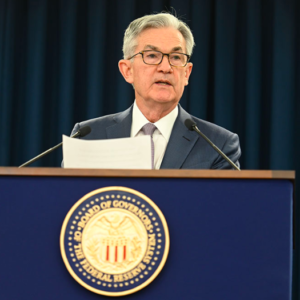Federal Reserve Chairman Jerome Powell is desperately trying to salvage his tarnished reputation for allowing inflation to surge to a 40-year high. However, Powell appears to be engaging in monetary policy overkill in his newfound zeal to slay the inflation dragon he helped create. That could leave him with the unenviable legacy of first allowing inflation to rip and then producing an unnecessarily hard economic landing in the form of a deep recession.
Last year, Powell contributed to inflation’s resurgence by persisting with an ultra-easy monetary policy for too long. He did so by keeping interest rates at their zero lower bound even when the economy was recovering strongly and receiving its largest peacetime budget stimulus on record. He allowed the broad money supply to balloon by 40 percent within two years.
Another critical policy mistake Powell made last year was to allow equity valuations to soar to nosebleed levels experienced only once in the last 100 years and home prices to exceed their 2006 level even after adjusting for inflation. He did so by allowing the Fed to flood the market with $120 billion a month in liquidity through the Fed’s quantitative easing program even at a time when equity and home prices were on fire.
Now, to make amends for his past mistake of pursuing an overly easy monetary policy for too long, Powell is slamming hard on the monetary policy brakes. Not only has he raised interest rates three times in unusually large 75 basis point steps, but he clearly indicated that more large interest rate increases are in the pipeline. He has also committed the Fed to withdraw market liquidity at the unprecedented pace of $95 billion a month through quantitative tightening. He is doing so even when the equity and bond markets are on the back foot.
Unfortunately, there are many reasons to think that Powell’s newfound monetary policy religion will produce a hard economic landing next year.
Among these reasons is that, even though monetary policy operates with long lags, the monetary policy tightening to date has already plunged the housing market into recession-like conditions. As mortgage rates have more than doubled from less than 3 percent at the start of the year to 6.5 percent, mortgage applications have plummeted by 30 percent and housing affordability has declined to an all-time low. Meanwhile, builders’ confidence keeps declining and home prices have begun to fall.
Another reason for fearing a hard landing is that recent monetary policy tightening already appears to have burst the equity and bond market bubble. Since the start of the year, equity and bond prices have declined by more than 20 percent. That represents a loss in household wealth of around $12 trillion, or 50 percent of GDP. This massive wealth loss occurs when households are struggling with high inflation and when consumer confidence is fragile.
Yet another reason for concern is that the Fed’s tightening of monetary policy is occurring when the budget stimulus has long since faded and when the rest of the world’s economy is in a very poor state. Europe is on the cusp of a meaningful economic recession due to a Russian shutdown of natural gas exports this winter. China’s economic growth has come to a halt as a result of its COVID lockdowns and acute problems in its property sector. Meanwhile, the World Bank is warning that we could be on the verge of a wave of emerging market debt defaults.
The Fed’s current monetary policy hawkishness is exacerbating the rest of the world’s economic problems by causing the dollar to surge and capital to be repatriated to the United States. That, in turn, is heightening the risk of an economic crisis abroad that could have a spillover effect on our shores.
If we do have a deep economic recession next year, we likely will have exorcised our inflation demons. However, Powell’s legacy hardly will have been salvaged. Some will compare him to Arthur Burns, whose loose monetary policy paved the way for the 1970s’ inflation. Others will liken him to Alan Greenspan, whose policy mistakes contributed to the 2008-2009 Great Economic Recession.

